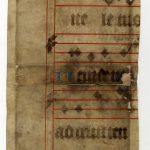For the description of the fragment’s former host volume see the online catalogue of the HAS Library, amongst Old books – Rare books (RBK):
The owner inscriptions show that the separate titles of the composite volume were bound together after 1711. Albert Nyáry gave the book in 1874 as a present to Vilmos Fraknói (at that time he still used the name Frankl). It got to the Library of the Academy in 1952 with the materials of the Istituto Storico Ungherese di Roma which was founded by Fraknói in 1892. (comp. Körmendy Kinga, „Az ún. Zalka Antiphonale töredékei” [Fragments of the so-called Zalka Antiphoner], Zenetudományi Dolgozatok, ed. Felföldi László—Lázár Katalin, Budapest, HAS Institute for Musicology, 1988, 33–40, here 35.)
Fragment of the Graduale Varadinense. On the recto parts of the tract of the St. Benedict’s mass were preserved: the end of the first verse (Inter discipulorum manus), and the beginning of the second verse (Deinde manus ad caelum tendens). The tract continues with its third verse’s (Haec dies in qua felix) end on f.2. The texts and melodies are identical to the parallel chants of the Graduale Strigoniense (the so-called “Bakócz” Gradual, Esztergom, Cathedral Library Ms. I.1a–b, f. 240). On the verso, after the Benedict-tract, a rubric refers to the offertory (Posuisti) and likely to the communion Fidelis servus, however the latter assumption is quite faint. The introit (Rorate caeli) and the gradual (Tollite portas) of the mass of Annuntiatio BMV are written in rubrics, than assumedly the tract (Ave Maria) stands after those with music.
The tract Hodie sanctus pater is a real curiosity, Szendrei also counted it amongst the special chants of the Graduale Bakócz. The tract, besides this source only occurs in the Missal of Pécs (Szendrei, Graduale Strigoniense, f. 178v, edition I/70). The only source containing it on the Cantus Index is the breviary of the Benedictine abbey of Břevnov CZ-R 418 (f. 28v).
Zsuzsa Czagány



